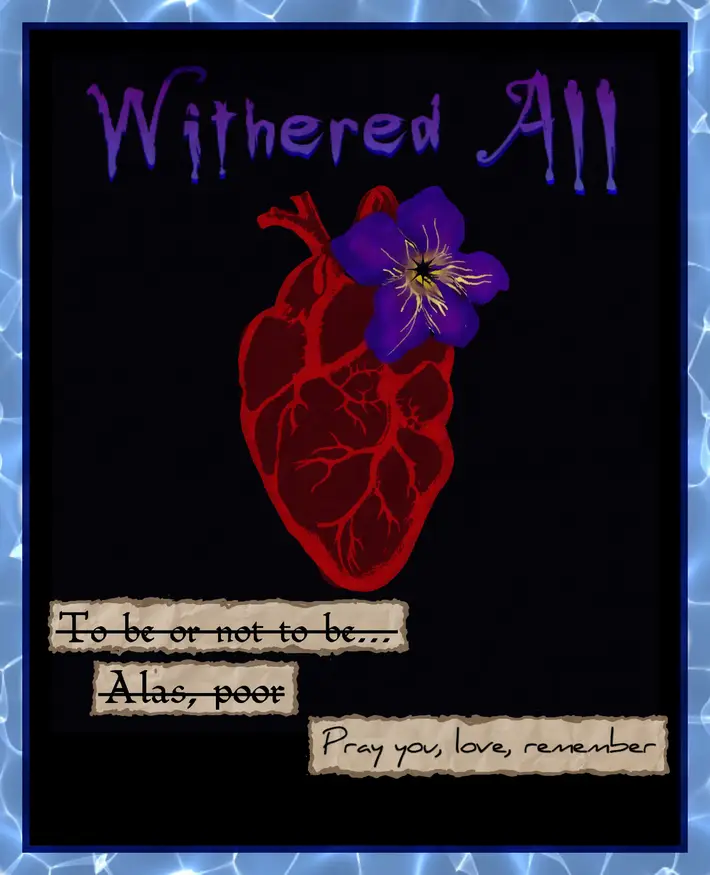SALT LAKE CITY — “I’d give you some violets – but they withered all when my father died.” (Hamlet 4.5)

Withered All, an original play written and directed by Miranda Morenzi, presents a daring take on Shakespeare‘s classic plays, with a particular focus on Hamlet. However, this is not Hamlet’s story; it is Ophelia’s. After her death, Ophelia (played by Berlyn Johns) finds herself trapped between life and the afterlife. She cannot move on until she comes to terms with the events that drove her to take her own life. With the guidance of the dead jester Yorick (played by Alyx Vaughn), as well as several other women from Shakespeare’s works, Ophelia searches for a method to the madness and flowers for her bouquet. She cannot move on until she finds herself . . . or if not herself, some violets, at least.
Withered All is a Shakespeare lover’s dream. The script is faithful to the original material while also asking the audience to view the story they know from a new perspective. It combines scenes taken directly from Hamlet with more analysis based scenes where Ophelia learns lessons from her fellow Shakespearean women. The transitions between these different types of scenes felt very natural and created a wonderful sense of pacing. Though the play was long, with a two-hour run time, each scene was a perfect length: long enough to dig into the material, but short enough that it never got boring. These transitions also helped to create a bizarre liminal space that felt reminiscent of Alice in Wonderland: the characters included a mad jester and a mad queen, and actors entered through windows and curtains, with locations and characters changing rapidly and frantically. Additionally, the characters showed an interesting self-awareness: frequently noting that they were “being watched,” and that they were characters in a story with scenes, lines, entrances, and exits. These bold directing choices from Morenzi allowed for interesting and engaging storytelling.
Despite some of these unconventional elements, the ensemble of actors gave honest and complex performances. Johns played Ophelia (a challenging role) masterfully. Not only does the character experience an intense emotional journey, but Johns only left the stage once to do a quick 30-second costume change. Throughout the course of the show, Johns shows Ophelia’s confusion, joy, heartache, grief, anger, and madness. The character experiences a full range of human emotion and grows to find strength and peace, all over the course of two hours. Johns performed this range and growth beautifully, and she was incredibly engaging to watch and carries the emotional backbone of the play with grace and strength.
A large part of Ophelia’s journey is navigating her complicated feelings regarding her relationship with Prince Hamlet (played by J. Attridge). In the original Hamlet, it can be difficult to be invested in Hamlet and Ophelia’s relationship because the romance between them is only hinted at. Withered All gave so much more depth to their relationship. The first interaction between Hamlet and Ophelia is a new scene that is based on events implied in the original play. The characters are flirtatious, innocent, and so obviously in love. Later, both in Withered All and the original Hamlet, Ophelia is forced by her father to return that letter to Hamlet. Having the opportunity to watch these characters be happy and in love made it all the more devastating to watch their relationship fall apart. Johns and Attridge had lovely chemistry; the journey from innocent love to complicated heartache was wonderfully believable. Both characters had such desperation to understand and be understood by the other, and this tension added so much to every scene they shared.
I have seen many productions of Hamlet, and while Hamlet was not the main character in Withered All, Attridge’s interpretation of Hamlet is possibly my favorite. The character had many sweet and charming moments that made him likable, despite his poor choices. The desperation in his madness, particularly in the “get thee to a nunnery” scene and Ophelia’s funeral was raw, moving, and honest. Hamlet is a complicated character, particularly in this retelling. It was relieving to see that they didn’t villainize him, like they easily could have with this feminist perspective, rather the character was very human. He wasn’t a villain, but he was not excused or forgiven for all of the hurt he caused.
Another character of interest from the original Hamlet is the jester Yorick, who is only seen in the events of the original play as a skull famously held by Hamlet in the graveyard. (“Alas, poor Yorick! I knew him.”) In Withered All, Yorick acts as Ophelia’s primary guide, connecting dots, and explaining Ophelia’s predicament. Vaughn’s Yorick was charming and eccentric, guiding the audience through the story just as much as he was guiding Ophelia. Vaughn also provided some much needed comic relief throughout the show. Characters this big and eccentric can sometimes feel fake, but Vaughn’s Yorick felt genuine and walked that fine line very well.
While it focuses on the characters and events from Hamlet, Withered All also features many women from Shakespeare’s other works, including Phoebe and Rosalind (played by Alyssa Vaughn and Cameron Maurin, respectively) from As You Like It, Hero (played by Jessie Pew) from Much Ado About Nothing, Juliet (played by Jessie Heaton), Lady Macbeth (played by Harper Mcgee), and more. This ensemble presented interesting takes on what happened to these women after the events of their respective plays and how Shakespeare treated his female characters. These actors played this variety of characters in bold and interesting ways, teaching Ophelia lessons that helped her grow.
Each supporting character’s section had a very clear tone that stood apart from the other sections. These sections were rich with Shakespearean references, which would be enjoyable for someone very familiar with his plays. I am an avid Shakespeare fan, and it consistently took me some time in each scene to figure out who was who and what they were talking about. The lack of context made some scenes less enjoyable for me, especially the one featuring the Princess of France (from Love’s Labour’s Lost). I imagine someone less familiar with Shakespeare’s works, would be bewildered for much of Withered All.
The writing, directing, and acting in Withered All displayed a rich understanding of Shakespeare and introduced bold analysis and new ideas. The play was a good look at the inner workings of human emotion and dealt with themes of death, love, strength, identity, forgiveness, and womanhood. The plays addresses the heavier themes in a direct and accessible way. Withered All is a beautiful play that will stick with me for a while. It is not for everyone, but for lovers of Shakespeare, it is essential viewing.
[box]The Kingswood Players production of Withered All plays Thursdays through Saturdays and Mondays at 7:30 PM at The Box (167 South Rio Grande Street, Salt Lake City). Tickets are $12. For more information, visit https://kingswoodplayersth.wixsite.com/kwpt.[/box]

